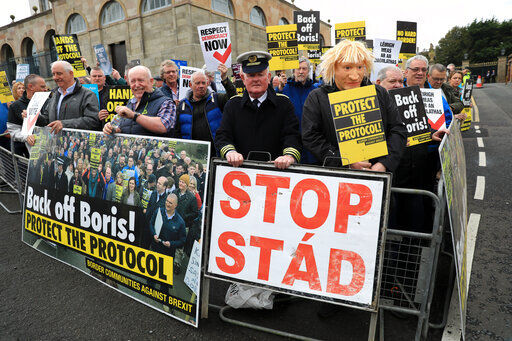LONDON — Britain is ramping up a feud with the European Union by pressing on with a plan to rip up parts of the post-Brexit trade deal it signed with the bloc.
Legislation that rewrites trade rules for Northern Ireland is scheduled to get its first major House of Commons debate today, the first step on what could be a rocky journey through Parliament.
The legislation, if approved by lawmakers, would remove checks on goods entering Northern Ireland from the rest of the U.K., thereby scrapping parts of a trade treaty that Prime Minister Boris Johnson signed before Britain left the EU in 2020.
Johnson said he thought the plan could be approved “fairly rapidly” if Parliament cooperates, and that the measures could become law by the end of the year.
“What we are trying to do is fix something that I think is very important to our country, which is the balance of the Belfast/Good Friday Agreement,” Johnson told reporters at the Group of Seven summit in Germany.
The British government says the rules are burdening businesses and undermining peace in Northern Ireland. It argues the unilateral move is justified under international law because of the “genuinely exceptional situation.”
Northern Ireland Secretary Brandon Lewis said Sunday that the aim was to “fix,” rather than throw out, the trade agreement, known as the Northern Ireland Protocol.
Johnson’s opponents, however, say the move is illegal and will shred Britain’s international reputation. It is also causing concern among some of the prime minister’s fellow Conservatives, already worried about Johnson’s judgment — and popularity — following a series of ethics scandals and two special election defeats.
The EU has threatened to retaliate, raising the specter of a trade war between the two major economic partners.
The bloc’s ambassador to Britain, Joao Vale de Almeida, said Britain’s plan was “illegal because it is a breach of international law, a breach of EU law, U.K. law and international law.”
“It is a treaty that we signed, ratified and even went through a general election in this country,” he told Times Radio.
Northern Ireland is the only part of the U.K. that shares a border with an EU country, Ireland. When Britain left the European Union and its borderless free-trade zone, the two sides agreed to keep the Irish land border free of customs posts and other checks because an open border is a key pillar of the peace process that ended decades of violence in Northern Ireland.
Instead, to protect the EU’s single market, there are checks on some goods, such as meat and eggs, entering Northern Ireland from the rest of the U.K.
Johnson’s Conservative government claims overzealous EU implementation means the rules are not working as expected and are causing a political crisis in Northern Ireland.
“You have got one tradition, one community, that feels that things really aren’t working in a way that they like or understand — you’ve got unnecessary barriers to trade between Great Britain and Northern Ireland,” Johnson said.
“All we are saying is you can get rid of those whilst not in any way endangering the EU single market,” he said.
British unionists there say the checks are fraying the bonds between Northern Ireland and the rest of the U.K., seen by some unionists as a threat to their British identity. Northern Ireland’s main unionist party is blocking the formation of a new power-sharing government in Belfast, saying it won’t take part until the Brexit trade rules are scrapped.
“I want to see the reestablishment of the Northern Ireland Assembly and the Executive, and the protocol is getting in the way of that,” Lewis told Sky News. “We have got to resolve that. That’s what this legislation will do.
“Ultimately, we want to do this by agreement with the EU,” he added. “But to do that, they need to show some flexibility and actually come and negotiate in a flexible way.”


